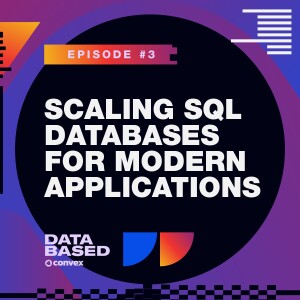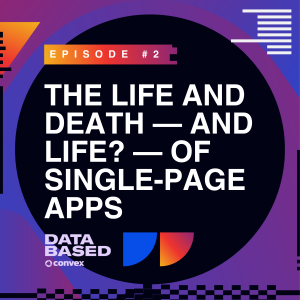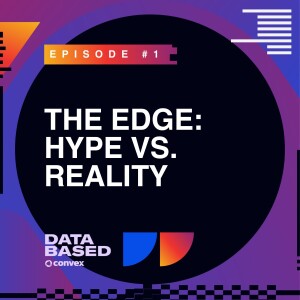The Databased Podcast
”Databased” is the essential podcast for web developers and technology leaders navigating the complexities of building scalable, high-performance applications in the modern startup landscape. Hosts Tom Redman, Jamie Turner, and James Cowling, known for their work building billion-dollar backend systems at Dropbox, dive deep into the world of databases, infrastructure, and edge computing. Each episode challenges conventional wisdom and explores the realities of crafting applications that can withstand the demands of today’s users. Through expert insights, thought-provoking discussions, and entertaining segments, ”Databased” provides clarity amidst the hype, helping you make informed decisions about your technology stack. Join us as we explore how to build and ship applications faster with a smaller team.
Episodes

Thursday Aug 01, 2024
Thursday Aug 01, 2024
In this episode of Databased, Tom Redman speaks with Jamie Turner and James Cowling about the historical context that necessitated the invention of SQL 1.0 and how these databases have scaled over time. They touch on the challenges of maintaining transactionality and consistency, the rise and limitations of NoSQL databases, and optimizing for developer velocity without compromising on foundational database principles.
This episode is a must-listen for anyone interested in database technology and its legacy as it is carried into modern software development.
Key Topics Discussed:
Evolution of SQL databases from early implementations to modern-day MySQL and Postgres.
Importance of transactionality and consistency in relational database management systems.
Challenges of database scaling and performance optimization for high concurrency and large datasets.
Comparison between SQL and NoSQL databases, highlighting strengths and limitations.
The role of SQL as the lingua franca for querying databases.
Strategies for balancing developer velocity with robust database management.
Future trends and innovations in database technology, focusing on maintaining core principles while adapting to new demands.
Key Takeaways:
The historical context and evolution of SQL databases to appreciate their foundational role in data management.
The transactionality and consistency in database design to ensure data integrity and reliability.
The strengths and limitations of SQL versus NoSQL databases when choosing the right database for your application.
Query performance by using indexing and proper query planning to handle high concurrency and large datasets.
Balancing developer velocity with robust database practices to maintain sustainable growth and development efficiency.
SQL as a powerful querying language that simplifies complex data retrieval tasks.
The benefits to adopting modern database solutions that incorporate the core principles of relational models while addressing new technological demands.
Current database practices to identify areas where transactionality and consistency might be compromised.
Strategies to scale databases effectively, keeping in mind performance and reliability.

Thursday Jul 11, 2024
Thursday Jul 11, 2024
In the second episode of Databased, Tom Redman speaks with Jamie Turner and James Cowling about the evolution of single-page applications (SPAs) and their roller-coaster-like relevance in the industry. They weigh in on the debate between SPAs and multi-page applications (MPAs), and how server-side rendering (SSR) impacts SEO.
The trio also shares practical insights on optimizing web performance, emphasizing the balance between innovation and real-world application. Whether you're a developer or tech enthusiast, this episode offers valuable perspectives on the future of web development.
Key Topics Discussed:
The evolution and current relevance of single-page applications in the web development landscape.
The debate between single-page applications and multi-page applications for modern web projects.
The impact of server-side rendering on search engine optimization and user experience.
Practical insights on optimizing web performance and balancing innovation with real-world application.
Historical perspective on early web development techniques, including CGI bin scripts and static websites.
The significance of reducing page load times and its effect on user engagement and interaction.
The role of server components in simplifying web development and improving application performance.
Real-world examples and case studies illustrating the benefits and challenges of different web architectures.
The importance of maintaining modular and ergonomic code for better development practices.
Predictions on the future trends in web development and the potential impact of new technologies.
Key Takeaways:
Evaluate the pros and cons of single-page applications versus multi-page applications for your specific project needs.
Implement server-side rendering to improve search engine optimization and enhance user experience.
Incorporate modular and ergonomic code practices to improve maintainability and scalability of your web applications.
Utilize server components to simplify development and enhance application performance.
Measure the impact of reducing page load times on user behavior and conversion rates.
Adopt best practices for balancing innovation with real-world application to achieve practical and effective web solutions.
Explore the benefits and challenges of different web architectures through real-world examples and case studies.

Monday Jun 24, 2024
Monday Jun 24, 2024
In this inaugural episode of Databased, Tom Redman speaks with Jamie Turner and James Cowling as they dive deep into the world of edge computing and its impact on modern web development.
Key Topics Discussed:
What is "the edge" in computing and why has it become a buzzword?
The evolution of edge computing from useful technology to overhyped solution
Physical limitations of distributed systems, including the speed of light
Challenges of maintaining data consistency across distributed locations
Use cases where edge computing makes sense vs. where it adds unnecessary complexity
The importance of co-locating compute with data for most applications
How platforms can leverage edge technology without burdening developers
Key Takeaways:
Edge computing isn't inherently bad, but it's often not the right solution for most applications
The laws of physics (speed of light) create fundamental limitations for distributed systems
Co-locating compute with data often provides better performance than edge computing for data-intensive applications
Developers should focus on building features quickly rather than prematurely optimizing with complex distributed systems
Platforms should abstract away the complexities of edge computing, allowing developers to focus on building their applications

